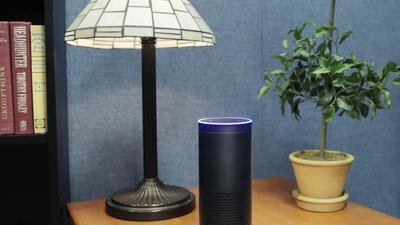My dishwasher annoys me. So do my home security camera, air purifier and robot vacuum. My car too. The reason: none of them take voice commands.
My TV, speakers and lights, on the other hand, dote on every word my wife and I say, which is why I love them.
When we tell them to turn on and off, they do. When we ask the lights to change colour or the TV to play the latest episode of our favourite shows on Netflix, they oblige.
There's no need to press buttons or, worse, take out our phones, open an app and tap some settings. We just say a magic phrase – in our case, "Hey Google" – followed by what we want them to do and it gets done.
I realise it’s the epitome of a first-world problem (I live in Toronto), but controlling our gadgets and appliances verbally is so easy and intuitive that everything else seems frustrating in comparison now.
The trend lines show that many people are realising the same thing. Voice control and the artificial intelligence that powers it is finally here and it works – and it is starting to take off. Amazon’s Alexa, Google Assistant, Apple’s Siri and Microsoft’s Cortana are about to invade everything.
These assistants popped up in all manner of products at the annual Consumer Electronics Show in Las Vegas in January. Alexa, for one, was shown off in General Electric lamps, Lenovo speakers, Samsung robot vacuums, Ford cars and even LG refrigerators.
The Google Assistant, meanwhile, is rolling out into wearables and cars. Apple and Microsoft are continuing their own respective forays into automobiles. Eager not to get left out, Samsung purchased Viv, a start-up from the original makers of Siri, in the autumn with plans to incorporate the upstart voice AI into electronics and appliances.
Amazon has been leading the charge since 2014, when it launched the Echo. Aside from serving as a simple speaker for playing music, the Echo also houses Alexa, which can answer spoken queries and fulfil a variety of requests. Users can verbally create calendar entries, send messages or even order products from the online retailer.
Amazon has not disclosed how many speakers it has sold, but it has said they are among its hottest products. Echo devices are available only in the United States, United Kingdom and Germany so far, but external estimates place sales as high as 14 million.
That number is sure to balloon this year as Alexa proliferates into other third-party products.
Google is close behind. The Google Assistant made its US debut in October in Pixel phones and Google Home speakers. Recently the company expanded the assistant to Android Wear smartwatches and all Android phones running version 6.0 and higher. Coming soon: Android TVs and Android Auto interfaces.
The analysis firm Gartner expects the market for speakers alone to hit US$2.1 billion by 2020. A separate forecast from Global Market Insights expects AI voice assistants to be worth $11bn overall by 2024.
So far, it’s been a primarily American story but with competition heating up so fiercely, voice assistants are likely to be everywhere and in every language before long.
Like all new technologies, this one is provoking a good deal of angst. A recent Gartner survey found that two-thirds of consumers are worried about these devices eavesdropping on them, a warranted concern given that they are entirely built around always-on microphones.
Several recent events are fuelling the fears, such as an FBI demand that Amazon release a suspect’s Alexa data in a murder investigation. WikiLeaks also recently leaked documents suggesting the CIA was hacking into the microphones in Samsung TVs.
Voice assistant makers are defending themselves by saying that users can look up and delete the information their devices gather. They are also quick to point out that microphones on most devices can be turned off or muted when not in use.
Despite that, Amazon, Google and the others clearly have some work to do in building consumer trust. They need to be more explicit in how data is collected and managed and they must build stronger safeguards into their products to keep outsiders out.
If they don’t, and more cases emerge where hackers and authorities access users’ sensitive voice data and conversations, the technology as a whole will end up dead on arrival.
That would be a serious shame because it would mean a return to using apps and pushing buttons. Once you’ve had a taste of the easy voice-controlled future, it’s hard to imagine going back to that horror.
Peter Nowak is a veteran technology writer.
business@thenational.ae
Follow The National's Business section on Twitter

